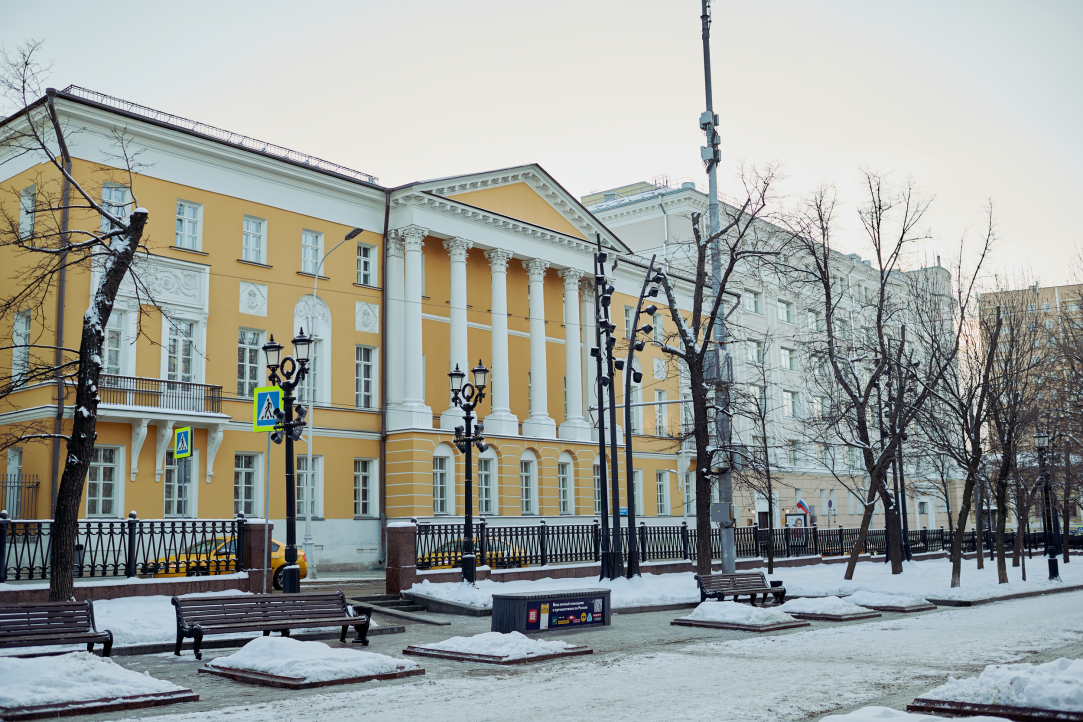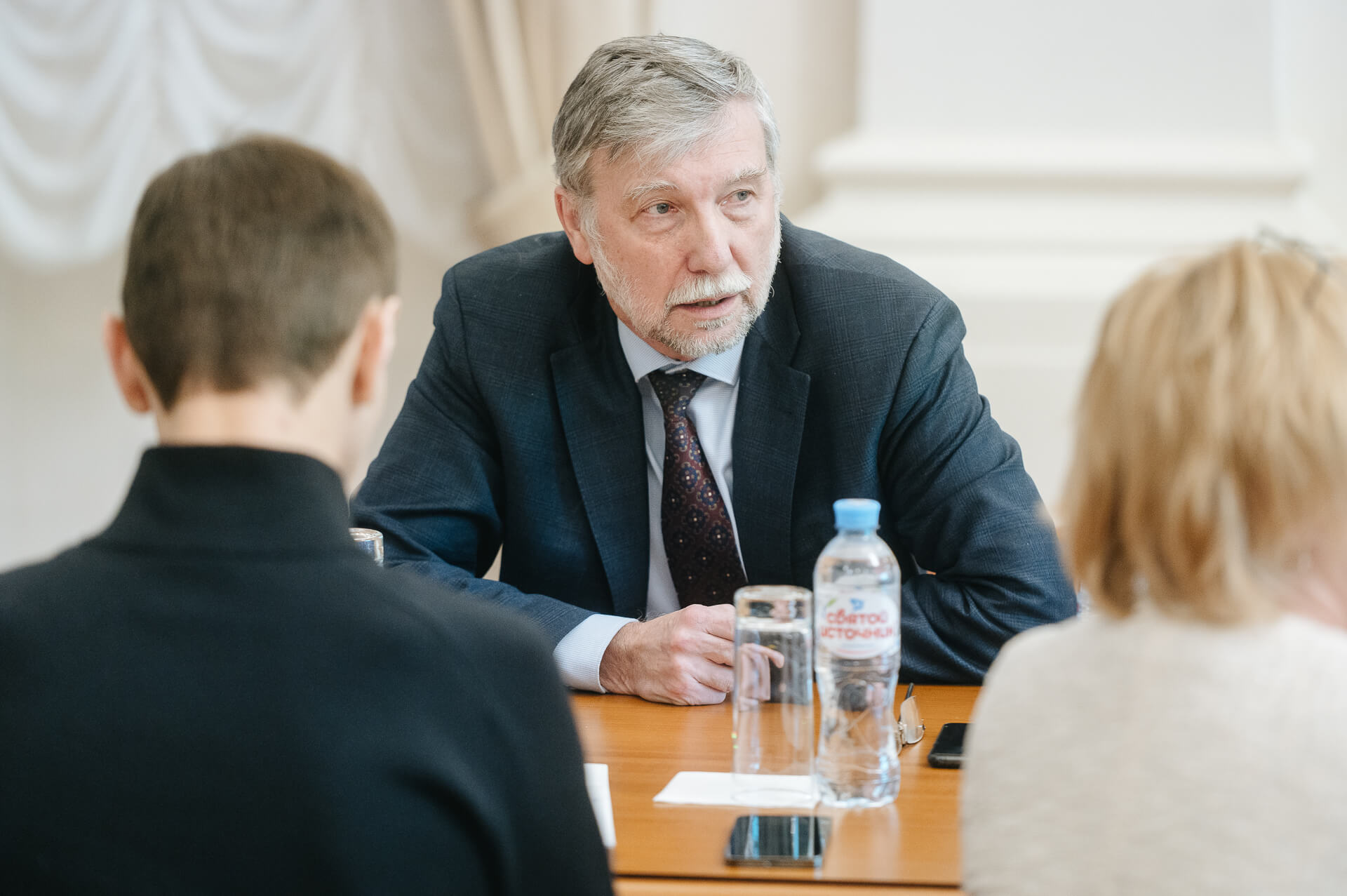‘University Life in Partnership with Artificial Intelligence’

HSE University is one of the leaders in IT education and research in the field of artificial intelligence (AI). Thanks to this, the university recently received the highest grant of the Priority 2030 programme. The integration of AI technologies into education is set to become a strategic direction for the university’s development over the next five years. What changes are coming to HSE University in this regard and how they will affect students and teachers? These issues were discussed at a meeting of HSE University’s Academic Council on December 20.
At the beginning of the meeting, HSE University Rector Nikita Anisimov noted that the university had proven its leading position in the first group of the ‘Research Leadership’ area of the Priority 2030 programme and received the largest grant.
He outlined and commented on eight points characterising HSE University’s development in 2023, which formed the basis of his report at the meeting of the Programme Council:
connecting social and humanitarian knowledge with digital sciences
capitalisation of accumulated scientific potential
creating human-oriented technologies through strategic projects
maintaining high standards of education quality
youth development for the country’s sustainable future
development of the management system to ensure the university’s sustainability
ensuring a contribution to supporting youth and the development of education and science in Russia’s regions
maintaining the position of a world-class national research university in the new geopolitical conditions

One of the Priority 2030 Council’s recommendations was to focus more on AI technologies for people. ‘In conditions where no one has any doubts about the role and value of artificial intelligence technologies for the further existence of humanity, we need to understand how it will become part of our large community’s life,’ said Nikita Anisimov.

As Yaroslav Kuzminov, HSE University’s Academic Supervisor, emphasised, ‘HSE University is practically the only university that has retained the scale of financial support from previous years due to the fact that we acted impeccably in cooperation with the Ministry of Digital Development of Russia by participating in the Digital Departments project.’
HSE University’s Vice Rector Sergey Roshchin gave a report on AI, the main item on the meeting agenda.
According to him, the university realised earlier than others that everyone should have digital competencies, and today HSE University is virtually an information technology university. The number of bachelor’s and master’s programmes that are in one way or another related to computer science is larger than the number of programmes in economics and management.

Sergey Roshchin suggested treating existing achievements as prerequisites for further development. ‘There is quite a serious turn ahead,’ he said.
In the near future, they plan to update the Data Culture project, under which all students of bachelor’s programmes will receive digital competencies. One component of the project will be changed this academic year as an experiment, then next year systematically. Students will have to study data analysis, methods of working with AI, and generative models in various fields—from design and Asian studies to management and law.
The developments of the Data Culture project will be transferred to a major (part of the main educational programme that forms the knowledge system in the main area of training), where courses related to the use of AI will appear. According to Sergey Roshchin, only 5% of disciplines currently cover interaction with various elements of AI.
The space of programmes whose graduates have subject and instrumental competencies and can apply these competencies in the selected subject areas will expand. There are already many such programmes at the master’s and bachelor’s levels, such as Computational Social Sciences.
Generative models should become part of students’ learning toolset—they can be used in projects, coursework, and graduation papers. In addition, students will have the opportunity to take part in projects to test technologies for identifying generative models.
Updating the skills, abilities, and competencies of teachers is another large-scale task which will allow the university to remain competitive. ‘2024 should be a year of large-scale retraining of teaching staff,’ concluded Sergey Roshchin.
Artificial intelligence should also be utilised to assist teachers by performing routine tasks. For example, an AI evaluator is being developed based on an array of data from independent exams within the framework of the Linguatest certification testing system implemented by HSE University.
According to the speaker, HSE University should become a university where artificial intelligence permeates all subject areas. The university’s online campus has already engaged in reworking all AI-related aspects, and this work needs to be implemented at the four traditional campuses as well.
There is also an ethical aspect of using AI in the educational process. Sergey Roshchin proposed the formulation of an ethical code within HSE University, which will be the first regulation of how different participants in the educational process interact with AI.
Commenting on the report, Nikita Anisimov noted that the discussion is about a very serious area in which ‘we take responsibility not just for the introduction of education in the field of artificial intelligence at the university, but for the life of the university in partnership with artificial intelligence.’
See also:
Neural Network Trained to Predict Crises in Russian Stock Market
Economists from HSE University have developed a neural network model that can predict the onset of a short-term stock market crisis with over 83% accuracy, one day in advance. The model performs well even on complex, imbalanced data and incorporates not only economic indicators but also investor sentiment. The paper by Tamara Teplova, Maksim Fayzulin, and Aleksei Kurkin from the Centre for Financial Research and Data Analytics at the HSE Faculty of Economic Sciences has been published in Socio-Economic Planning Sciences.
Larger Groups of Students Use AI More Effectively in Learning
Researchers at the Institute of Education and the Faculty of Economic Sciences at HSE University have studied what factors determine the success of student group projects when they are completed with the help of artificial intelligence (AI). Their findings suggest that, in addition to the knowledge level of the team members, the size of the group also plays a significant role—the larger it is, the more efficient the process becomes. The study was published in Innovations in Education and Teaching International.
Designing an Accurate Reading Skills Test: Why Parallel Texts are Important in Dyslexia Diagnosis
Researchers from the HSE Centre for Language and Brain have developed a tool for accurately assessing reading skills in adults with reading impairments. It can be used, for instance, before and after sessions with a language therapist. The tool includes two texts that differ in content but are equal in complexity: participants were observed to read them at the same speed, make a similar number of errors, and understand the content to the same degree. Such parallel texts will enable more accurate diagnosis of dyslexia and better monitoring of the effectiveness of interventions aimed at addressing it. The paper has been published in Educational Studies.
Intellectual Capital in the Face of Shocks: Russia and Iran Explore Internationalisation
In today's issue of Schola, Mariya Molodchik, Senior Research Fellow at the International Laboratory of Intangible-Driven Economy and Professor at the School of Economics and Finance at HSE University’s Campus in Perm, discusses a joint project with Iran University of Science and Technology, titled 'Internationalization of Companies from Developing Countries: The Role of Intellectual Resources in Response to Exogenous Shocks.'
HSE Researchers Introduce Novel Symmetry-Aware Neural Network Architecture
Researchers at the HSE Laboratory for Geometric Algebra and Applications have developed a new neural network architecture that can accelerate and streamline data analysis in physics, biology, and engineering. The scientists presented their solution on July 16 in Vancouver at ICML 2025, one of the world's leading conferences on machine learning. Both the paper and the source code are publicly available.
Students from HSE and Other Universities Carry Out Research Expedition at New Chersonesos
As part of the Rediscovering Russia student expedition programme, HSE University organised a research trip under the framework of the School for Young Humanities Scholars to the New Chersonesos museum and church complex in Sevastopol. The results of this expedition will form the basis for proposals on educational projects aimed at shaping young people’s historical memory of the role of Chersonesos, Crimea, and the Byzantine legacy in the history of Russian culture and statehood.
HSE Researchers Determine Frequency of Genetic Mutations in People with Pulmonary Hypertension
For the first time in Russia, a team of scientists and clinicians has conducted a large-scale genetic study of patients with pulmonary arterial hypertension. The team, which included researchers from the International Laboratory of Bioinformatics at the HSE Faculty of Computer Science, analysed the genomes of over a hundred patients and found that approximately one in ten carried pathogenic mutations in the BMPR2 gene, which is responsible for vascular growth. Three of these mutations were described for the first time. The study has been published in Respiratory Research.
First Caucasus School on Experimental Research and Cognitive Sciences Takes Places in Adygea
On September 17–20, 2025, the First Caucasus School on Experimental Research and Cognitive Sciences took place at the Gornaya Legenda venue of Adyghe State University (ASU). The event was organised by the ASU Experimental Linguistics Laboratory, the HSE Centre for Language and Brain, and the HSE Centre for Sociocultural and Ethnolinguistic Studies. The school brought together over 50 participants—students, doctoral candidates, and early-career researchers from across Russia, along with lecturers and speakers from France, Serbia, China, Turkey, Kazakhstan, and Uzbekistan.
HSE Scientists Reveal How Disrupted Brain Connectivity Affects Cognitive and Social Behaviour in Children with Autism
An international team of scientists, including researchers from the HSE Centre for Language and Brain, has for the first time studied the connectivity between the brain's sensorimotor and cognitive control networks in children with autism. Using fMRI data, the researchers found that connections within the cognitive control network (responsible for attention and inhibitory control) are weakened, while connections between this network and the sensorimotor network (responsible for movement and sensory processing) are, by contrast, excessively strong. These features manifest as difficulties in social interaction and behavioural regulation in children. The study has been published in Brain Imaging and Behavior.
Scientists Develop New Method to Detect Motor Disorders Using 3D Objects
Researchers at HSE University have developed a new methodological approach to studying motor planning and execution. By using 3D-printed objects and an infrared tracking system, they demonstrated that the brain initiates the planning process even before movement begins. This approach may eventually aid in the assessment and treatment of patients with neurodegenerative diseases such as Parkinson’s. The paper has been published in Frontiers in Human Neuroscience.


